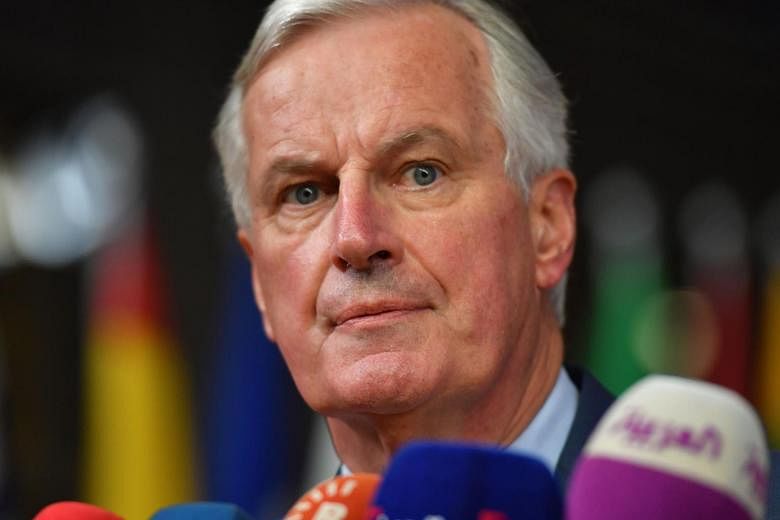PARIS/BRUSSELS (AFP, REUTERS) - The European Union's chief Brexit negotiator Michel Barnier said on Friday (Oct 19) that the thorny issue of the border between Ireland and the British province of Northern Ireland could sink the negotiations on Britain's exit from the European Union.
"The answer is yes," he said when asked on France Inter radio if the Irish border issue could cause the negotiations to collapse.
"I believe we need a deal. I'm not yet sure we'll get one. It is difficult, but possible."
EU leaders warned Britain on Thursday they would offer no more concessions to break the deadlock in Brexit negotiations, but expressed confidence that a deal can be done before the country leaves the bloc next March.
A Brussels summit wrapped up without progress after British Prime Minister Theresa May offered no new proposals, beyond suggesting she could accept a longer transition period after Brexit.
Mrs May has been struggling since the 2016 referendum vote to leave the EU to reconcile the demands of her eurosceptic Conservative party with the realities of negotiating with Brussels.
Her difficulties were laid bare by the fury sparked back home at her suggestion that she could extend a post-Brexit transition period to address the Irish border issue.
Both sides have agreed there should be a legally binding "backstop" arrangement to avoid frontier checks between British Northern Ireland and EU member Ireland if and until a new trade deal solves the issue.
This would come into effect after the transition ends - but both sides strongly disagree on its terms, and the issue is holding up the rest of the Brexit talks.
Britain crashing out of the EU without an agreement is viewed as potentially catastrophic, as tariffs, customs and regulatory issues could severely disrupt trade.
Ireland insists on 'backstop'
Britain's foreign minister Jeremy Hunt said it would be hard to resolve the issue of a backstop to the Irish border problem without more detail on the future relationship with the EU after Brexit.
"If we're going to resolve this, we need to make more progress on the future relationship," Mr Hunt told BBC radio on Friday, adding that a UK-wide customs union solution to the issue was possible as long as it was not indefinite.
He also said that the EU had been more constructive in its tone since he controversially compared the bloc to the Soviet Union last month.
Meanwhile in Brussels, Irish Prime Minister Leo Varadkar said on the third day of EU summit meetings that a possible extension of Britain's post-Brexit transition period would not diminish Ireland's need for a "backstop" to avoid a hard border with Northern Ireland.
He also told reporters that it would be up to Mrs May to decide whether she had to defy opposition from her unionist Northern Irish allies and agree to the EU's proposed backstop, which would potentially create trade barriers between Northern Ireland and the British mainland.
He said it was a "judgment call" Mrs May would have to make but said that without an Irish backstop, any withdrawal treaty might not be ratified by the European Parliament.
He acknowledged that Mrs May faces a difficult domestic political situation, running a minority government with internal divisions on the
Brexit issue.
Mr Varadkar also renewed a warning that a return of customs posts on his country's border with Northern Ireland could see a return to violence in the British province: "Certainly it's something that's in the back of my mind as a potential consequence if we get this wrong."
On the issue of extending Britain's transition period, he said: "I'm open to the idea of an extension or a longer transition period, but that's not an alternative to a legally binding Irish backstop. So, certainly not an alternative, it's just something that might be part of the mix."

